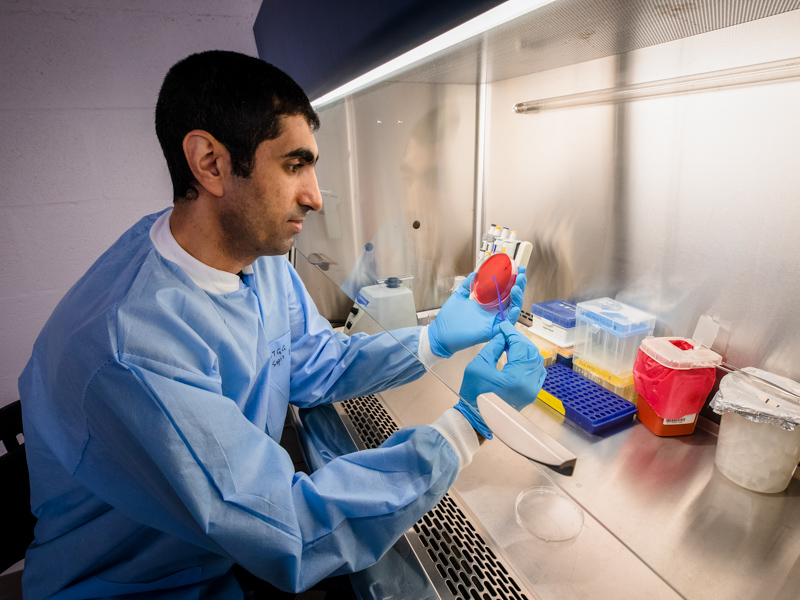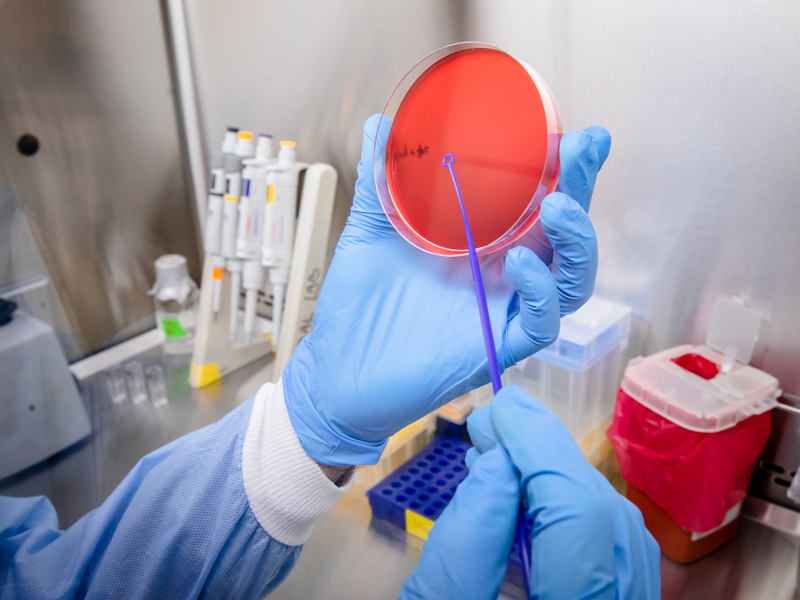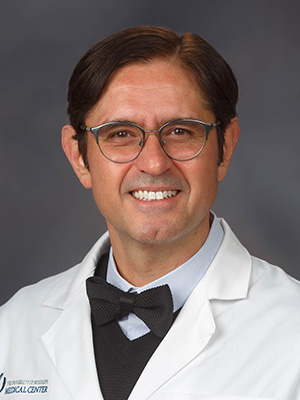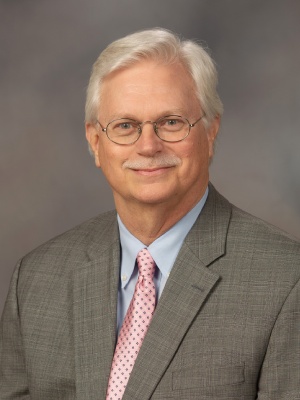Fulbright scholar chooses UMMC Microbiology for fellowship

Dr. Babek Alibayov first learned he had earned a Fulbright grant to study in the United States in November 2019. While he started planning for his 6,800-mile journey west from Azerbaijan to Mississippi, strange pneumonia cases starting popping up in 4,600 miles to his east in China.
After a six-month delay, Alibayov made it to Jackson in January and the University of Mississippi Medical Center welcomed its first scholar through the Fulbright Program.
Founded in 1947, this U.S. Department of State initiative is a series of fellowships designed to boost international relations through teaching, training and research. Alibayov was selected for Fulbright’s Visiting Scholar program, which awards international postdoctoral researchers with grants that allow them to pursue projects at American universities.
“The main aim of my research while here is to study the epidemiology and evolution of antimicrobial resistance in bacteria,” said Alibayov, who will spend six months at UMMC.

He is particularly interested in studying the molecular evolution of virulence, or a microbe’s ability to cause illness, in bacteria such as Escherichia coli and Clostridium perfringens. It’s a topic that ties in well with his previous work in Azerbaijan.
“I mainly work with bacteria and studying the risk of food-borne diseases,” said Alibayov, who served as head of quality control for the Supply and Procurement Division of his country’s Ministry of Agriculture.
Alibayov said that antibiotic resistance and microbial food-borne diseases are global issues that affect people in the United States, Azerbaijan and elsewhere. In 2015, The World Health Organization published a report detailing the global burden of disease related to food- and water-borne illness. The WHO also considers antimicrobial resistance – the development of “superbugs” – one of the world’s most pressing public health issues.
Interested in math and science as a child, Alibayov earned bachelors and master’s degrees in biology in Azerbaijan, a Eurasian country once part of the former Soviet Union. He then went to Czechia (the recently renamed Czech Republic) to earn a PhD in microbiology and do postdoctoral research at the University of Chemistry and Technology in Prague, where he studied Staphylococcus aureus and the enterotoxins it produces. Since 2018, he has worked for Azerbaijan’s equivalents of the United States’ Food and Drug Administration and Department of Agriculture.
“The Fulbright fellowship is also an opportunity to learn to do scientific work with new kinds of machines, assays and reagents and bring those skills back to Azerbaijan,” Alibayov said.
While at UMMC, he will work with Dr. Jorge Vidal, associate professor of microbiology and immunology.

“Babek contacted me during my transition from Emory University to UMMC, asking if we could work together on a project,” Vidal said. “He’s a smart, brilliant guy, and early on in our conversations, it was clear what he wanted to do with his project.”
Vidal had met other Fulbright scholars while working in Atlanta, but had not hosted one in his own laboratory.
“The goal of the Fulbright program is to bring brilliant people to the United States, but also to create a collaborative exchange and form strong relationships between different countries,” Vidal said.
The Vidal lab conducts basic and translational research including studies on how bacteria like Streptococcus pneumoniae become pathogenic and resistant to drug treatments.
“While I was considering applying for the Fulbright grant, I spent lots of time reading [Dr. Vidal’s] publications and found that his research interested me,” Alibayov said. He added that this was the most important factor in selecting a faculty sponsor for the program.
“When you choose a laboratory, that decision should be dependent on the specialization of your mentor. Who you study with is more important than where you study,” he said.
While UMMC’s late Dr. Julius Cruse, a Guyton Distinguished Professor and professor of pathology was a Fulbright Fellow at the University of Graz in Austria in 1958, Alibayov is the first Fulbright scholar to come to UMMC.

“The fact that we are hosting a Fulbright Scholar is an evident reflection of the maturity and quality of our research programs here at UMMC,” said Dr. Richard Summers, associate vice chancellor for research.
The 2020-2021 cohort of Fulbright Visiting Fellows includes 850 scholars from about 100 countries. The highly competitive application process involves submitting a proposal through the U.S. Embassy in the applicant’s home country.
“The Fulbright Scholars are a special community,” Alibayov said.
The emergence of the COVID-19 pandemic delayed Alibayov’s fellowship, originally planned for summer 2020. However, that didn’t stop him from joining the Vidal lab for virtual meetings, academic reading and planning his research for the upcoming semester.
Alibayov says people at UMMC and in the community have been “very helpful” in getting him settled in Jackson. He spends his free time catching up on Netflix films and exploring his neighborhood by foot. He also enjoys basketball and volleyball, but COVID-19 has limited his chances to play. His American roommates have also taken the time to introduce him to new cuisine: Louisiana Cajun-style.
“I don’t remember what it was called, but it tasted good,” he said.
As the pandemic subsides, he hopes to find more opportunities to collaborate in person with other UMMC scientists and engage with UMMC’s international community. Both Alibayov and Vidal hope that they can extend the research stay for another six months through other forms of funding.


